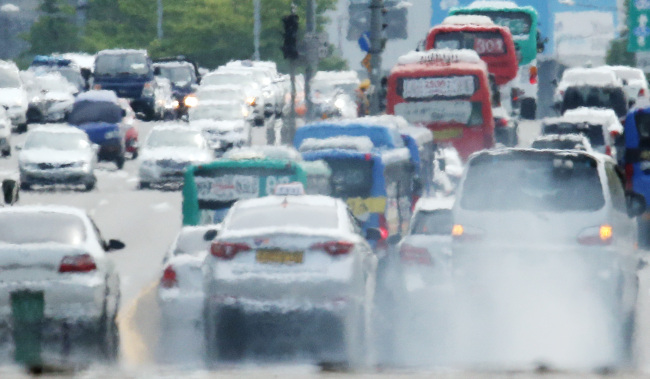The Ministry of Environment said Thursday it joined hands with the mayors of Seoul and Incheon and the governor of Gyeonggi Province to control the number of worn-out diesel cars to create a cleaner atmosphere in the metropolitan area.
Following the accord signed by the municipalities with the ministry, some 1.4 million diesel cars registered before 2005 in metropolitan areas that are under air pollution control will be restricted on the road.
But old diesel cars that have passed an inspection conducted by the Korea Transportation Safety Authority every one or two years will be excluded from the restriction. Cars that attached exhaust reduction devices or went through engine modification will also be excluded.
The accord will take effect starting with Seoul in 2017, followed by Incheon and 17 cities in Gyeonggi Province in 2018 and the rest of the metropolitan areas across the country in 2020.
The ministry explained that the measure is being introduced as diesel cars registered before 2005 are produced without exhaust reduction devices. The ministry added that those cars can produce as much as eight times more emissions compared to recently produced diesel cars.
Following the accord signed by the municipalities with the ministry, some 1.4 million diesel cars registered before 2005 in metropolitan areas that are under air pollution control will be restricted on the road.
But old diesel cars that have passed an inspection conducted by the Korea Transportation Safety Authority every one or two years will be excluded from the restriction. Cars that attached exhaust reduction devices or went through engine modification will also be excluded.
The accord will take effect starting with Seoul in 2017, followed by Incheon and 17 cities in Gyeonggi Province in 2018 and the rest of the metropolitan areas across the country in 2020.
The ministry explained that the measure is being introduced as diesel cars registered before 2005 are produced without exhaust reduction devices. The ministry added that those cars can produce as much as eight times more emissions compared to recently produced diesel cars.

To encourage drivers’ participation, the government said it plans to provide a discount for car owners when they purchase new vehicles after scrapping old diesel cars. Negotiations on the discount is currently under review with local automakers, the ministry added.
For drivers in the low-income bracket, the government will cover 90 percent of the cost to attach exhaust reduction devices on their cars and modify their engines. This would usually cost about 6.5 million won ($5,800) altogether.
Upon the number of worn-out diesel cars being reduced, the ministry said annual fine dust emissions would also decrease to 1,071 ton by 2020, accounting for 28 percent of the current level at 3,769 tons.
The ministry said it also expects to see a cleaner atmosphere in cities as more vehicles have exhaust reduction devices attached, from the current 144,000 vehicles to 423,000 vehicles by 2024.
By Kim Da-sol (ddd@heraldcorp.com)
For drivers in the low-income bracket, the government will cover 90 percent of the cost to attach exhaust reduction devices on their cars and modify their engines. This would usually cost about 6.5 million won ($5,800) altogether.
Upon the number of worn-out diesel cars being reduced, the ministry said annual fine dust emissions would also decrease to 1,071 ton by 2020, accounting for 28 percent of the current level at 3,769 tons.
The ministry said it also expects to see a cleaner atmosphere in cities as more vehicles have exhaust reduction devices attached, from the current 144,000 vehicles to 423,000 vehicles by 2024.
By Kim Da-sol (ddd@heraldcorp.com)



![[Exclusive] Korean military set to ban iPhones over 'security' concerns](http://res.heraldm.com/phpwas/restmb_idxmake.php?idx=644&simg=/content/image/2024/04/23/20240423050599_0.jpg&u=20240423183955)

![[Graphic News] 77% of young Koreans still financially dependent](http://res.heraldm.com/phpwas/restmb_idxmake.php?idx=644&simg=/content/image/2024/04/22/20240422050762_0.gif&u=)



![[Pressure points] Leggings in public: Fashion statement or social faux pas?](http://res.heraldm.com/phpwas/restmb_idxmake.php?idx=644&simg=/content/image/2024/04/23/20240423050669_0.jpg&u=)










